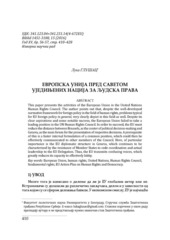Европска унија пред Саветом Уједињених нација за људска права
Чланак у часопису (Објављена верзија)
Метаподаци
Приказ свих података о документуАпстракт
This paper presents the activities of the European Union in the United Nations Human Rights Council. The author points out that, despite the well-developed normative framework for foreign policy in the field of human rights, problems typical for EU foreign policy in general, very clearly depict in this field as well. Despite its clear aspirations and some notable success, the European Union failed to take a leading position in the UN Human Rights Council. In order to succeed, the EU must reduce the distance between Brussels, as the center of political decision-making and Geneva, as the main forum for the presentation of respective decisions. A prerequisite of this is a faster internal formulation of a common position, which could then be effectively communicated to other members of the Council. Here, of particular importance is the EU diplomatic structure in Geneva, which continues to be characterized by the resistance of Member States to cede coordination and actual leadership to the ...EU Delegation. Thus, the EU transmits confusing voices, which greatly reduces its capacity to effectively lobby.
Кључне речи:
European Union / human rights / United Nations / Human Rights Council / fundamental rights / EU Action Plan on Human Rights and DemocracyИзвор:
Европско законодавство, 2016, 56-57, 410-428Издавач:
- Institut za međunarodnu politiku i privredu
Колекције
Институција/група
IFDTTY - JOUR AU - Глушац, Лука PY - 2016 UR - 341.123.04+341.231.14(4-672ЕU) UR - http://rifdt.instifdt.bg.ac.rs/123456789/2225 AB - This paper presents the activities of the European Union in the United Nations Human Rights Council. The author points out that, despite the well-developed normative framework for foreign policy in the field of human rights, problems typical for EU foreign policy in general, very clearly depict in this field as well. Despite its clear aspirations and some notable success, the European Union failed to take a leading position in the UN Human Rights Council. In order to succeed, the EU must reduce the distance between Brussels, as the center of political decision-making and Geneva, as the main forum for the presentation of respective decisions. A prerequisite of this is a faster internal formulation of a common position, which could then be effectively communicated to other members of the Council. Here, of particular importance is the EU diplomatic structure in Geneva, which continues to be characterized by the resistance of Member States to cede coordination and actual leadership to the EU Delegation. Thus, the EU transmits confusing voices, which greatly reduces its capacity to effectively lobby. PB - Institut za međunarodnu politiku i privredu T2 - Европско законодавство T1 - Европска унија пред Саветом Уједињених нација за људска права IS - 56-57 SP - 410 EP - 428 UR - https://hdl.handle.net/21.15107/rcub_rifdt_2225 ER -
@article{
author = "Глушац, Лука",
year = "2016",
abstract = "This paper presents the activities of the European Union in the United Nations Human Rights Council. The author points out that, despite the well-developed normative framework for foreign policy in the field of human rights, problems typical for EU foreign policy in general, very clearly depict in this field as well. Despite its clear aspirations and some notable success, the European Union failed to take a leading position in the UN Human Rights Council. In order to succeed, the EU must reduce the distance between Brussels, as the center of political decision-making and Geneva, as the main forum for the presentation of respective decisions. A prerequisite of this is a faster internal formulation of a common position, which could then be effectively communicated to other members of the Council. Here, of particular importance is the EU diplomatic structure in Geneva, which continues to be characterized by the resistance of Member States to cede coordination and actual leadership to the EU Delegation. Thus, the EU transmits confusing voices, which greatly reduces its capacity to effectively lobby.",
publisher = "Institut za međunarodnu politiku i privredu",
journal = "Европско законодавство",
title = "Европска унија пред Саветом Уједињених нација за људска права",
number = "56-57",
pages = "410-428",
url = "https://hdl.handle.net/21.15107/rcub_rifdt_2225"
}
Глушац, Л.. (2016). Европска унија пред Саветом Уједињених нација за људска права. in Европско законодавство Institut za međunarodnu politiku i privredu.(56-57), 410-428. https://hdl.handle.net/21.15107/rcub_rifdt_2225
Глушац Л. Европска унија пред Саветом Уједињених нација за људска права. in Европско законодавство. 2016;(56-57):410-428. https://hdl.handle.net/21.15107/rcub_rifdt_2225 .
Глушац, Лука, "Европска унија пред Саветом Уједињених нација за људска права" in Европско законодавство, no. 56-57 (2016):410-428, https://hdl.handle.net/21.15107/rcub_rifdt_2225 .



